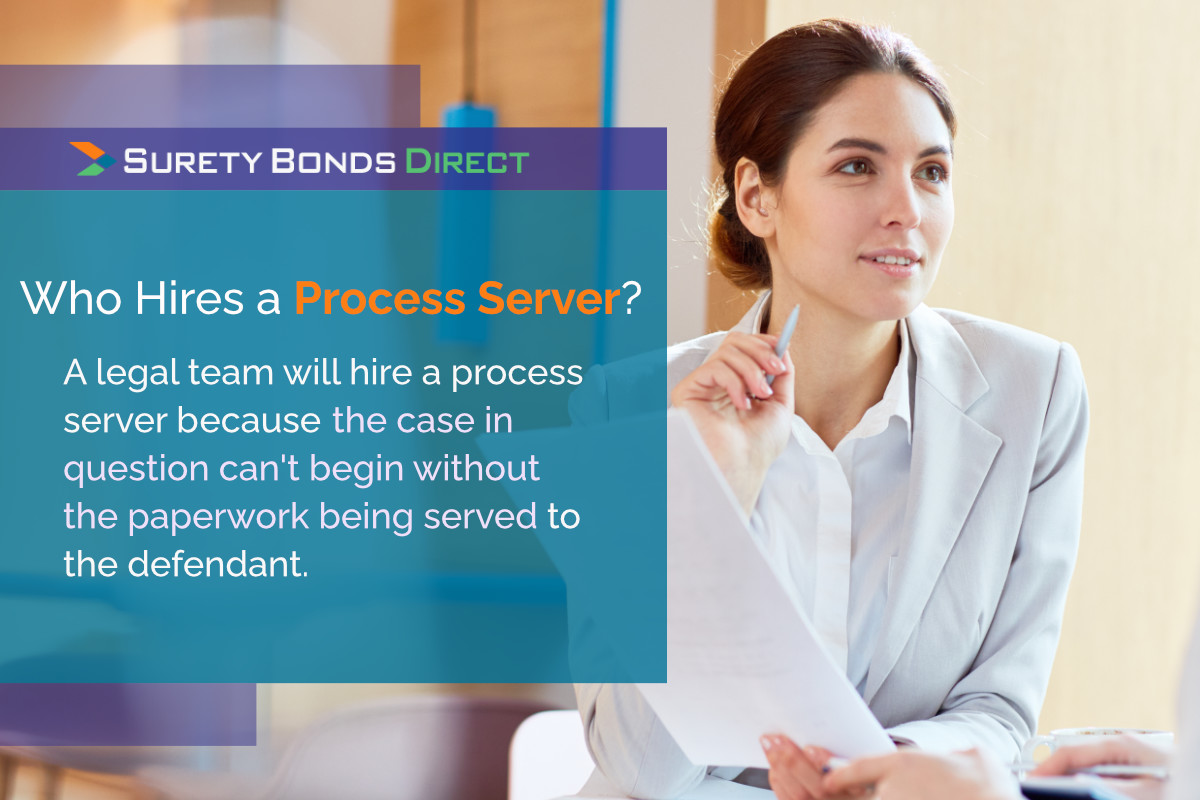A process server is an individual in charge of serving official court complaint paperwork to another individual.
This article covers:
- Responsibilities of a process server.
- Common mistakes process servers make.
- Requirements for being a process server.
- Process server license requirements
- Process server requirements for select states.
What Does A Process Server Do?
The sequence of an official court complaint outlines what a process server does step by step.
Step 1: A Petition Or Complaint Is Filed With The Court
A person, business entity, or government entity files a complaint against another person, business entity or government entity with the appropriate court.
Step 2: The Court Issues "Summons"
The "summons" outlines the complaint and serves as a formal notice to a defendant that a lawsuit has been filed against them.
Step 3: The Defendant Responds To Summons
Once the defendant has the paperwork they decide how to respond.
Who Hires A Process Server?

A legal team will hire a process server because a case can't begin without the paperwork being served to the defendant.
The amount of time to serve paperwork to the defendant varies by state. A process server can offer expedited service and charge additional fees.
If paperwork is not served within the defined time frame, the case is in jeopardy of being thrown out by the judge.
The Types of Paperwork Being Served

Writs
Writs are documents that tell the person being served, they need to appear in court for a stated purpose. The individual is not a defendant in a lawsuit.
Complaints
A complaint is a written statement that outlines the cause of action against a defendant.
Subpoenas
A document instructing a person to appear in court to provide information related to:
- A legal matter
- A deposition
- Providing documents to the court
- Handing over related evidence
- Miscellaneous other reasons
Summons
A summons is an official notice that a lawsuit has been filed. The person receiving a summons is being sued.
Other Documents
- Divorce papers
- Eviction notices
- Bankruptcy proceedings
- Various other documents
All Documents Must Contain:
- The court's name
- The names of the parties in the case
- The amount of time the defendant has to appear and respond
- A court clerk’s signature
- The court's seal
The Step By Step After Complaint Is Filed
Step 1: Serve The Paperwork
Find and serve the documents to the appropriate person(s) or entity.
Serving paperwork to a business or government entity requires locating the representative of the business or government entity. The individual is listed by the court.
Keep good notes during this process. The opposing legal team can argue the validity of the serving process. Notes help prove what happened.
Step 2: Create and Finalize The Proof Of Service Document

Fill out a Proof of Service document. After this document is notarized, it's called an Affidavit of Service.
File the Affidavit of Service according to local regulations to complete the service process.
After an Affidavit of Service is filed, the opposing legal team cannot question the validity of the service process.
How To Get A Process Servicer License
Serving legal paperwork is a vital step in the court process. Without proper servicing of court documents, the judge can throw out a case. The legal team hiring a process server is demanding proper delivery of the documents with speed.
Not all states require a license for process servers. Examples are below, but some states require:
- At least 18 years of age
- Take an exam
- Pay a license fee
- Obtain a process server bond
A process server bond is a surety bond. A surety bond is a form of taking financial responsibility to protect the end customer of a service and the state’s licensing body.
In this case, the end customer is:
- The plaintiff and legal team
- The person being served
- The licensing body
Learn more about the parties involved in a surety bond.
If a mistake were to occur due to negligence and/or malicious intent, the above parties can make a claim against a bond to receive financial compensation. Successful claims tend to result in loss of license for the process server.
Process server bonds have a bond amount (aka bond penalty) ranging from $2,000 to $10,000. This is the bond amount, not the fee, or premium, to secure the bond.
The fee or premium is calculated based on a percentage rate. The rate is based on a personal credit score and financial standing. Rates tend to be 0.5% to 5% of the bond amount.
In most states a process server bond term is two years, but can be upwards of four years. Consult individual state requirements for precise term length. The bond term will almost always match the license term.
Obtaining a process server bond is a fast process. Surety Bonds Direct provides free online quotes or bond experts are available at 1-800 - 608 - 9950.
Common Process Serving Mistakes

Serving The Wrong Person
Locating certain individuals is not always an easy process. For example:
- Names can be similar
- Delivering to out of date addresses
- Searching for a person who is unknowingly deceased
- Mistaken identities
- A hard to find individual
If paperwork is delivered to the wrong person the opposing counsel can contest the service process and force the plaintiff's legal team to restart the case.
In some cases the legal team can lose prior judgements that were previously ruled in their favor.
Not Verifying And Finalizing The Serving Process
Not completing the Proof of Service document or filing the Affidavit of Service is a mistake.
Successful Affidavit of Service prevents the opposing legal team from contesting the process service or claiming incomplete delivery.
Negligence
Purposely delaying a court ordered levee on a bank account so the funds can be removed before the debtor takes the money.
Delaying or not serving writs of execution for a will which notifies the heirs and other beneficiaries that the executor has filed for authority to carry out the will.
There are many other scenarios where a process server can be negligent when serving paperwork from the court.
States That Require Process Server Licensing
New York
The licensing process is a little different from county to county.
- Application fees will vary.
- License is required if 5 or more services are completed in a calendar year.
- Attorneys permitted to practice in New York do not have to be licensed.
- Renewal cycle is every 2 years.
- Purchase and post a $10,000 surety bond.
- Plus additional paperwork.
Learn more on New York's website. Contact Surety Bonds Direct for a free quote and low rate on process server bonds in New York.
Michigan
No licensing is required in Michigan though requirements change based on individual Court Administrators.
Insurance or purchasing a process server bond is required. Contact the local Court Administrator or contact Surety Bonds Direct for detailed help to purchase a surety bond.
Georgia
Georgia requirements change county by county.
- Must be 18 years of age or older
- Must be a legal United States citizen
- No affiliation for the case being served
- Must complete a 12 hour pre-certification course
- Must pass an exam
- Purchase and post a surety bond in the amount of $25,000
- Pass a background check and provide fingerprints
Florida
Florida requirements vary county to county.
- Minimum age of 18
- Must be a permanent Florida resident
- Pass a background check. Check county requirements
- Pass an exam provided by the FAPPS
- Post a process server bond of $5,000. More details on local county website. Surety Bonds Direct can provide a quote for a bond
Tennessee
Process servers must be of legal age (18 years) and be appointed by the county clerk.
- A full background check is required.
- Proof of a valid business license is required.
- No official education or license is required.
- Purchase and post a $15,000 surety bond.
Requirements change county to county. Confirm specific requirements on the county’s website.
Oklahoma
Process servers are required to be licensed in the state.
- No education requirements
- Must purchase and post a $5,000 surety bond
- Pay $35 license fee for the issuing county
- Pay $150 fee for a statewide license
Montana
License is required if more than 10 court documents are served per year. To obtain a license the requires are:
- Pass a written exam.
- Purchase and post a $10,000 process server bond for individuals and up to $100,000 for a firm.
- Accrue 8 hours of continuing education during each year's license term.
California
License is required if more than 10 court documents are served per year. To obtain a license the requires are:
- No formal education is required
- Residency required for at least one year following registration
- A $2,000 process server bond or cash deposit
- A felony conviction forfeits registration
- Must be 18 years or older
- Must obtain two passport IDs
- Private investigator's are exempt from registration
Alaska
Must be licensed by the Alaska Commissioner of Public Safety. A process server bond of $15,000 must be posted by each process server.
The application must include:
- A sworn statement that the applicant is free from any mental or emotional disorder that may affect performance.
- A sworn statement that the applicant has read and understands the requirements of a process server according to Alaska.
- A sworn statement that the information contained in the application is true.
- Finally, a signature and valid notarization of the signature.
The following items must accompany the application:
- Two sets of fingerprints and fee for processing fingerprints
- Proof of process server bond
- $25 non-refundable application fee
- Copy of applicant’s valid Alaska business license
Check Local State and Country Requirements
Laws and requirements change. Confirm local state and county websites for current requirements.
Surety Bonds Direct can provide a free process server bond quote. Call a bond expert today at 1-800-608-9950.







